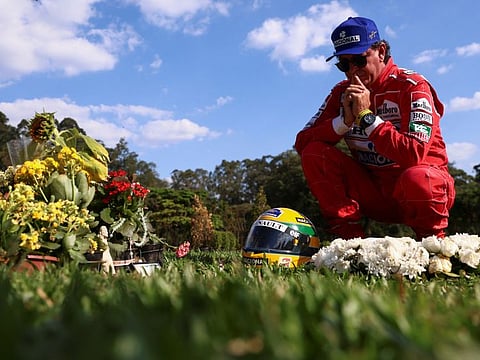Thirty years on Ecclestone regrets causing upset over Senna’s death
It caused unnecessary trouble, admits former Formula One supremo

Paris: Former Formula One supremo Bernie Ecclestone regrets prematurely informing Ayrton Senna’s brother the three-time world champion had died after his crash in the 1994 San Marino Grand Prix telling AFP it caused “unnecessary trouble.”
Speaking to AFP on Wednesday, 30 years to the day after Senna’s death, which sent shockwaves around the world, Ecclestone said he had misheard F1 doctor Sid Watkins.
Senna’s death at the age of 34 came a day after Austrian driver Roland Ratzenberger had been killed in the second qualifying session at Imola.
On the seventh lap, Senna’s Williams, which was leading at the time, hit a concrete wall at 211 kilometres per hour (131mph), leaving the Brazilian motionless in the cockpit.
“As soon as Senna’s accident happened I went into the control tower,” Ecclestone told AFP by phone from Portugal.
“Sid Watkins was at the scene of the accident. I thought he said ‘he is dead’ and told his brother (Leonardo Senna). When in fact Sid had said ‘it’s his head’.”
In fact, it was not until nearly four and a half hours after the accident, that Senna was pronounced dead in hospital.
“It caused unnecessary trouble,” admitted a sorrowful Ecclestone who had been on friendly terms with Senna and his family, and travelled to Brazil for the funeral.
But it was his then wife Slavica Radic who lined up to pay their respects.
“Ayrton used to ring my children late at night in Brazil and chat with them,” said the 93-year-old Englishman.
“The relationship soured a bit after his death with his sister (Viviane) and family, who thought that I should never have said he was dead when he was not.
“I never went to the funeral. I went to Brazil and my then wife stood at the front along with the Mayor of Sao Paulo as the funeral cortege passed. That is how close we were to him.
“I stayed in our hotel room and watched on television and came home straight afterwards.”
Ecclestone, who over several decades transformed Formula One into a global multi-billion-dollar commercial giant, said Senna was very much his own man.
“As a person you could not complain with Ayrton,” said Ecclestone.
“He was a really complete person, who had his principles and his own way to think about things.
“One respected he was a bit different.”
As for where he stands as a driver Ecclestone says he was competing in a much more competitive era than is the case at the moment with Senna tussling with Alain Prost, Nigel Mansell and Nelson Piquet.
“He was one of the best at the time, probably the best,” he said.
“I do not think anyone dominated as Max (Verstappen) is today.
“He was a flamboyant driver and a nice looking guy.”
‘From tragedy came positivity’
Senna’s death added to Ratzenberger’s and Rubens Barrichello’s close shave on the Friday — he was saved by Watkins — set the seal on a tragic weekend for the sport.
“It has never happened before or since that sort of a weekend,” Ecclestone told AFP.
“There is not much that you can do about it. It was upsetting what happened.”
Ecclestone, though, says there was never a call to cancel the race either from the promoters or the drivers after Ratzenberger’s death nor following Senna’s.
“There was not one suggestion from the drivers to cancel the race.
“I went into the briefing on the morning of the race and everyone was talking as usual.
“I said ‘be quiet for a minute and think about yesterday’. It was a job to even to get them to do that.
“I found it rather strange, as if they felt ‘it’s not going to happen to me’. But in the end they shut up for a minute.”
As for the promoters, Ecclestone says it would have been too complex for them to cancel.
“The truth of the matter is it would have been a big drama to cancel the race,” he said.
“It is the promoter that runs the race and they are the ones who would have to refund tickets.
“There was not much enthusiasm to do that.”
The then FIA president Max Mosley, however, told Ecclestone he feared the consequences of the weekend.
“Max feared that was the end of Formula One being as popular as it was at that time,” said Ecclestone.
“As it happened he was completely wrong.
“It became more popular, it garnered more front pages worldwide, publicity which did not happen to the sport previously.
“Out of tragedy came positivity.”



